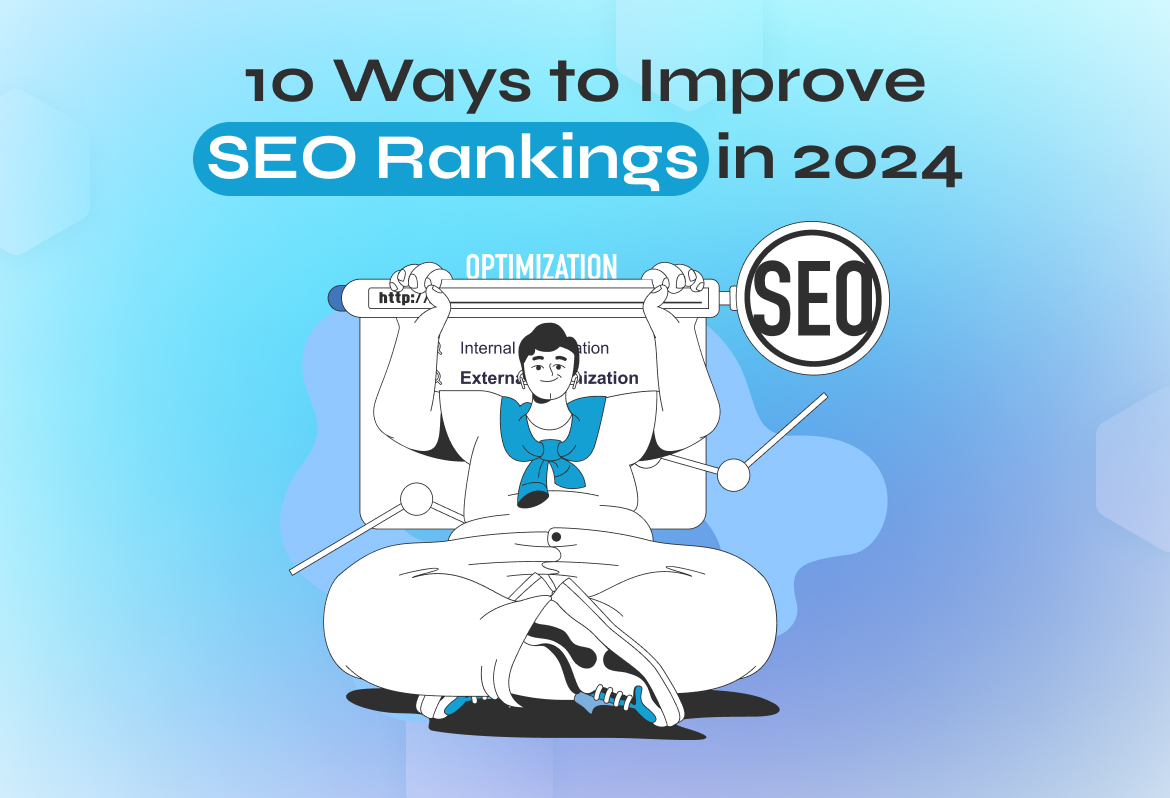In recent years, with the significant increase in the number of businesses and their expansion into more online spaces, Search Engine Optimization (SEO) has become an essential component for success.
While competing for visibility in an increasingly crowded online space, the ability to effectively optimize a website for search engines is crucial. It can greatly influence whether a business remains unnoticed online or achieves prominent visibility on the first page of search engine results.
10 ways to Improve SEO Rankings in 2024
This article delves into 10 Ways to Improve SEO Rankings in 2024, ensuring your website keeps pace with and excels in the ever-changing digital arena.
Website Speed Optimization

One of the most effective SEO ranking technique in 2024 remains website speed. It’s not just about delivering information anymore; it’s about how swiftly you can do it. Your website speed has direct effect on you Google rankings. Search engines, like Google, prioritize websites that load quickly, offering a seamless user experience. Neil Patel’s study shows that the pages you see at the top of google search results tend to load faster than the pages at the end of the page.
Here’s how you can optimize your website’s speed:
- Evaluate Current Speed: Begin by assessing your website’s current loading time. Tools like Google PageSpeed Insights can provide a comprehensive analysis and suggest improvements.
- Optimize Images: Large image files can significantly slow down your site. Use formats like JPEG or PNG, and consider compressing images without sacrificing quality.
- Leverage Browser Caching: Browser caching stores webpage resource files on a local computer when a user visits a webpage. Enabling this means return visitors will experience faster load times.
- Improve Server Response Time: The efficiency of your web server plays a crucial role. Opt for a reliable hosting solution and regularly monitor your server’s health to prevent any performance bottlenecks.
- Minimize CSS and JavaScript: Bulky files can slow down your site. Minimize the size of your CSS, JavaScript, and HTML files. Tools like CSS Minifier and JavaScript Minifier can be helpful.
- Use a Content Delivery Network (CDN): CDNs distribute the load, saving bandwidth and speeding up access for your users.
By prioritising these strategies, you can substantially enhance your website’s speed, contributing to improved SEO rankings and a better user experience.
High-Quality Content Creation

In SEO, the quality of content is essential. It’s not enough to have content; it needs to be engaging and informative so that it can create value for the reader. As we move through 2024, the emphasis on well-crafted content has only intensified. Here’s how to ensure your content stands out:
- Understand Your Audience: Knowing who you are writing for is paramount. Tailor your content to meet the interests, needs, and problems of your target audience.
- Focus on Originality and Value: Your content should offer something unique. Avoid rehashing existing content. Strive to provide new insights, comprehensive information, or a fresh perspective on familiar topics.
- Engage Through Storytelling: A narrative approach can captivate your audience more effectively than plain facts. Use storytelling to make your content more relatable and memorable.
- Optimize for User Intent: Align your content with what users are searching for. Address their questions, provide solutions, and offer valuable insights to meet their intent.
- Incorporate Multimedia Elements: Break up text with relevant images, videos, infographics, and other media. This enhances user engagement and encourages longer site visits, which can positively impact SEO.
- Update Regularly: The internet is dynamic, and so should be your content. Regular updates ensure relevance and show search engines that your site is active.
Creating high-quality content is not just about pleasing search engines; it’s about establishing a connection with your audience, offering them value, and enhancing their experience on your site.
Authority Backlink Strategies

The importance of backlinks remains constant. However, it’s not just any backlinks that matter; it’s the authoritative ones that truly boost your SEO rankings. Here’s how to build a strong backlink profile in 2024:
- Produce Link-Worthy Content: The foundation of earning backlinks is to create content that others want to reference. This includes comprehensive guides, insightful research, and informative case studies.
- Guest Blogging: Writing for reputable sites in your industry can be a powerful way to earn authoritative backlinks. Offer valuable content that aligns with their audience’s interest.
- Harness the Power of Social Media: Share your content on social platforms to increase visibility. Engaging content can attract backlinks as it gets shared across these networks.
- Engage in Community and Forum Discussions: Participating in online communities related to your field can help in gaining backlinks. Contribute genuinely and include links to your content when relevant.
- Use the ‘Skyscraper Technique’: Find popular content in your niche, create something better, and reach out to websites that link to the original content, suggesting they link to your improved version instead.
- Monitor Your Competitors: Keep an eye on where your competitors are getting their backlinks from. Tools like Ahrefs or SEMrush can help identify these sources, which you can then target for your own backlinking efforts.
By implementing these strategies with a focus on quality over quantity, you can build a strong portfolio of authoritative backlinks that significantly enhance your SEO performance.
Mobile-Friendly Website Design

Another important way to enhance your SEO rankings in 2024 is a Mobile-Friendly Website Design; Its significance has never been greater. Reflecting back to the fourth quarter of 2021, it’s noteworthy that 63% of Google’s search traffic share came from mobile devices, underscoring the rapidly growing trend of mobile internet usage. With a substantial portion of internet traffic coming from mobile devices, search engines favour websites that provide a stellar mobile experience.
Here’s how to ensure your website is mobile-friendly:
- Responsive Design: Implement a responsive website design that automatically adjusts content and layout based on the screen size of the device being used.
- Fast Loading Speed on Mobile: Similar to desktop, ensure your website loads quickly on mobile devices. Optimize images and use mobile-friendly plugins to accelerate loading times.
- Simplify Navigation: Mobile users prefer easy and straightforward navigation. Simplify your menu and make sure your website is easy to navigate with a touch screen.
- Readable Content without Zooming: Ensure that your text is easily readable on mobile devices without needing to zoom in. Choose fonts and sizes that are mobile-friendly.
- Accessible Contact Forms: Make sure any forms on your website are easy to fill out on mobile devices. Avoid lengthy forms and ensure form fields are adequately spaced.
- Test Mobile Usability: Regularly test your website on various mobile devices to ensure compatibility and usability. Tools like Google’s Mobile-Friendly Test can be helpful.
A mobile-friendly website not only caters to the user experience but also significantly contributes to SEO success, as search engines like Google prioritize mobile optimization in their ranking algorithms.
Long-Tail Keyword Optimization

In 2024, the optimization of long-tail keywords has become an important part of a successful SEO strategy. These specific, often longer phrases, are key to attracting a more targeted audience and improving search rankings.
Here’s how to effectively use long-tail keywords:
- Understand User Intent: Long-tail keywords are often closer to what users actually search for. Understanding the intent behind searches helps in crafting content that directly answers user queries.
- Research and Identify: Use keyword research tools like Google Keyword Planner, SEMrush, or Ahrefs to identify long-tail keywords relevant to your niche. Look for keywords with lower competition but high relevance.
- Incorporate in Content Naturally: Once identified, integrate these keywords into your content. The key is to use them naturally within the context, maintaining the quality and readability of your content.
- Optimize for Voice Search: With the rise of voice search, long-tail keywords become even more crucial. They often mimic the way people speak, making them ideal for voice query optimization.
- Use in Various Content Types: Incorporate long-tail keywords in blog posts, FAQs, and product descriptions. This diversification helps in ranking for those keywords in different types of searches.
- Track and Analyze Performance: Regularly monitor how these keywords perform in terms of traffic and rankings. Use this data to refine and adjust your strategy as needed.
By targeting long-tail keywords, businesses can effectively reach their niche market, improve search rankings, and drive more qualified traffic to their site.
Understanding Best SEO Practices in 2024

Understanding best SEO practices is crucial for achieving top search engine rankings. This year has brought some shifts and continued trends in the SEO landscape. Here’s a look at what’s defining SEO best practices in 2024:
- Emphasis on User Experience (UX): In 2024, user experience remains a pivotal aspect of SEO. This includes website speed, mobile responsiveness, intuitive navigation, and overall user engagement.
- Advanced E-A-T Principles: The focus on Expertise, Authoritativeness, and Trustworthiness (E-A-T) has evolved. Search engines are now more sophisticated in evaluating the credibility and quality of content, making it essential for websites to showcase their authority and expertise in their niche.
- Increased Integration of AI and Machine Learning: AI and machine learning continue to transform how search engines understand and rank content. The use of these technologies in optimizing for SEO is becoming more prevalent, necessitating a more data-driven approach to content creation.
- Voice and Visual Search Optimization: With the growing use of smart speakers and visual search technologies, optimizing for voice and visual queries is becoming increasingly important. This includes focusing on conversational keywords and ensuring visual content is SEO-friendly.
- Video Content for SEO: The trend of using video content for SEO is strengthening in 2024. This involves optimizing video titles, descriptions, and ensuring videos provide value and relevance to the target audience.
- Local SEO for Wider Reach: Strengthening local SEO strategies remains essential, especially for businesses looking to connect with nearby customers. Accurate Google My Business listings, local keywords, and location-based content are key.
- Sustainability and Ethical SEO: There’s a growing emphasis on sustainability and ethical practices in SEO. Websites that demonstrate eco-friendly practices and ethical business models are gaining favor in search rankings.
SEO Ranking Features

As we continue our journey into 2024, understanding and leveraging the latest SEO ranking features is crucial for any successful SEO strategy. Here’s a closer look at the key ranking features for this year:
- Core Web Vitals: Google’s Core Web Vitals, focusing on loading performance, interactivity, and visual stability, remain a top priority for ranking.
- Mobile-First Indexing: With mobile-first indexing, Google predominantly uses the mobile version of the content for indexing and ranking.
- AI and Algorithm Updates: The increasing role of AI in Google’s algorithm, focusing on understanding user intent and content relevance, cannot be overstated.
- Structured Data and Schema Markup: Using structured data helps search engines better understand and categorize your site’s content, enhancing visibility in search results.
- Content Depth and Quality: Search engines continue to prioritize in-depth, well-researched content that provides real value to the user.
- Local SEO and Geo-Targeting: For businesses targeting local markets, local SEO and geo-targeting are more important than ever in 2024.
Understanding and optimizing for these ranking features can significantly boost your website’s visibility and performance in search engine results pages (SERPs).
Adapting to AI and Machine Learning in SEO

The integration and adaptation to AI and machine learning technologies are increasingly becoming a pivotal aspect of SEO strategies in 2024. These advancements are revolutionizing how search engines operate and how SEO practitioners optimize websites. Here’s how to effectively adapt to this trend:
- Understand Search Algorithms: Keep abreast of how AI influences search algorithms, particularly in terms of content relevance and user intent.
- Leverage AI for Keyword Research: Utilize AI-powered tools for more advanced and predictive keyword research, uncovering opportunities that might be missed by traditional methods.
- Personalize User Experience: Use AI to analyze user data and personalize content, making the website more relevant and engaging for each visitor.
- Optimize for AI-Driven Voice Search: As voice search becomes more sophisticated, optimize your content for natural language queries and conversational keywords.
- Automate SEO Tasks: Use machine learning tools to automate routine SEO tasks such as site audits, enabling you to focus on more strategic aspects.
- Stay Updated on AI Trends: Regularly educate yourself on the latest developments in AI and machine learning within the SEO landscape to stay ahead of the curve.
Adapting to AI and machine learning not only keeps your SEO strategies effective but also ensures that you leverage cutting-edge technologies to maintain a competitive edge in search rankings.
SEO Marketing Integration

Integrating SEO into your broader marketing strategy is crucial in 2024. This holistic approach not only enhances your online visibility but also ensures a cohesive user experience across all channels. Here are key strategies for effective SEO marketing integration:
- Align SEO with Content Marketing: Your SEO efforts should go hand-in-hand with content marketing. Use SEO insights to guide your content creation, ensuring it’s both search-engine friendly and valuable to your audience.
- Leverage Social Media for SEO: While social media signals don’t directly impact search rankings, they influence SEO indirectly. A strong social media presence can drive traffic, increase brand awareness, and lead to more backlinks.
- Email Marketing and SEO: Use email marketing to promote your best SEO content. This can drive traffic to your website and increase user engagement, which are positive signals to search engines.
- Combine SEO and PPC Advertising: Combining SEO and Pay-Per-Click (PPC) advertising can yield comprehensive insights and a greater online presence. Use data from PPC campaigns to refine your SEO strategies and vice versa.
- Integrate Offline and Online Marketing: Ensure that your offline marketing efforts, such as events or print media, are aligned with your online SEO strategies. Use consistent messaging and cross-promote content across all platforms.
- Regular Analysis and Adaptation: Keep analyzing the results of your integrated marketing efforts. Use tools to track your SEO performance and adjust strategies accordingly for optimal results.
Integrating SEO into your overall marketing strategy creates a synergistic effect, where each element supports and enhances the others, leading to a stronger online presence and better overall performance.
Staying Updated with Latest SEO Techniques

In the fast-paced world of SEO, staying current with the latest techniques and trends is not just beneficial—it’s essential for maintaining competitive edge. Here’s how you can keep yourself updated in 2024:
- Follow Industry Experts and Blogs: Subscribe to renowned SEO and digital marketing blogs. Platforms like Moz, Search Engine Journal, and Neil Patel’s blog offer valuable insights and updates.
- Participate in Webinars and Online Courses: Regularly attend webinars and enroll in courses. This continuous learning approach keeps you abreast of new strategies and tools in SEO.
- Utilize SEO Tools and Analytics: Tools like Google Analytics, Ahrefs, and SEMrush not only help in managing your SEO efforts but also provide updates and insights on the latest trends and algorithm changes.
- Join SEO Forums and Groups: Engage with communities on platforms like LinkedIn, Reddit, and specialized SEO forums. These communities are valuable sources for real-time discussions and shared experiences.
- Attend Industry Conferences: Though digital resources are valuable, attending in-person conferences can provide unparalleled networking opportunities and insights from leading SEO professionals.
- Experiment and Adapt: Apply new techniques and strategies on a small scale to see their effectiveness. SEO is about adapting to changes and learning through practical implementation.
Staying updated with the latest SEO techniques allows you to adapt to changes quickly, implement effective strategies, and ensure that your website remains visible and competitive in search engine rankings.
Conclusion
In 2024, enhancing SEO rankings demands a blend of technical skill, content mastery, and adaptability to the digital landscape’s evolution. Key strategies like optimizing website speed, mobile responsiveness, quality content creation, and integrating SEO with broader marketing are vital for online visibility. Amidst the constant changes in digital algorithms, the consistent factor is delivering value and a superior user experience. By implementing these 10 strategies, you can elevate your SEO rankings and establish a robust online presence that connects deeply with your audience and meets their evolving needs.



